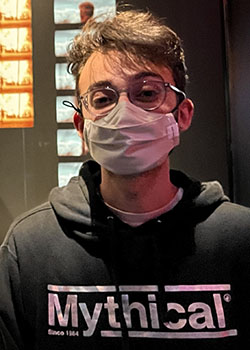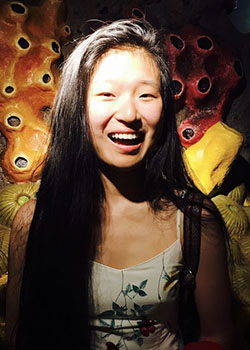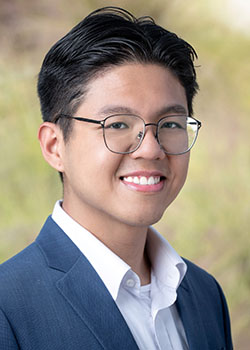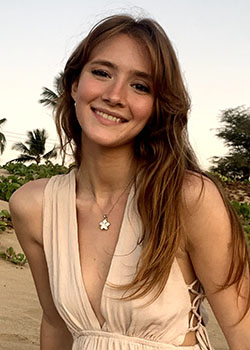Meet some of our Media Arts & Culture majors.
Amare Askerneese
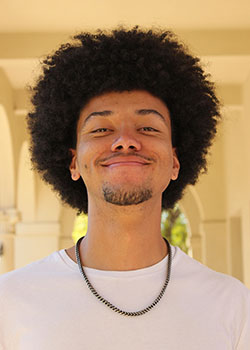
Hometown: Menifee, CA
Major: MAC (production)
Have you taken part in any student research opportunities through Oxy?
Prof. Lin invited me to be part of an Undergraduate Research Center research project as a facilitator for a participatory media workshop. I worked with formerly incarcerated AAPI adults from the API RISE (Asian Pacific Islander Re-entry through Inclusion, Support, and Empowerment) community in Little Tokyo. I was tasked with teaching participants the technical and formal functions of filmmaking, the etiquette of working on a film crew, and other skills necessary for the participants to create and share their stories in an audio-visual format.
The liberal arts lens of film study has shaped me to critically engage with the media that we cover in class in addition to deepening the framework of my film projects.
Did you study abroad? How did it enhance your education?
I had the opportunity to study abroad at the University of Sussex in Brighton, England. I took classes through the university’s Media Arts & Humanities department, including courses on sound design, studying and critiquing creative practices, and a course that mirrored the process of senior comps through creating and shooting a ten-minute film. It was a perspective-shifting experience that taught me countless lessons about history, culture, and filmmaking that I never would have learned otherwise.
What do you find most compelling about studying MAC?
Coming to Oxy, I knew that filmmaking was what I wanted to pursue and the MAC department has given me that experience and more. The liberal arts lens of film study has shaped me to critically engage with the media that we cover in class in addition to deepening the framework of my film projects.
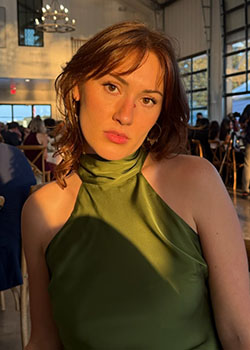
Kenna Bacon Mirzayan
Hometown: Incline Village, NV
Major: MAC (critical media) minor: Spanish
Can you describe your working relationship with MAC professors? Any standout classes you’ve taken?
I love the MAC professors at Oxy. As a transfer student from a larger institution, I appreciate how Oxy encourages interpersonal communication between professors and students. The professors in the MAC department have always been available to answer any questions, and they consistently make sure that their students feel supported. Some of my favorite classes that I have taken within the MAC department are Topics in Media: Cultures of Protest and the Junior Seminar, taught by Prof. Marciniak and Prof. de Fren, respectively. Both of these courses helped to shape me into a better writer and critical media student, and I'm so grateful for them!
I love the MAC professors. As a transfer student from a larger institution, I appreciate how Oxy encourages interpersonal communication between professors and students.
Did you study abroad? How did it complement your education?
I studied abroad in Madrid during the fall of my junior year. Before I applied to programs, I was worried that I would be one of the only members of my major to study off-campus and that would get me behind on my major requirements. But, as I found out later, about half of my cohort ended up going abroad that semester. The MAC department centers international and interdisciplinary education, so we were encouraged to go abroad and explore film studies outside of the United States. I can say that going abroad was one of the best decisions I ever made, and I was able to do so because Oxy fostered an environment that supported me throughout the process. Living abroad and taking courses taught from a Spanish perspective broadened my approach to media and cultural studies.
What are your ambitions post-Oxy and how has the liberal arts approach helped to put you on this path?
I am curious about the intersection between culture and language, and I see media as the perfect means by which to critically explore this connection. After Oxy, I want to teach abroad. I am passionate about education, and I want to make learning accessible and engaging for as many people as possible. The liberal arts education I have received at Oxy has definitely shaped me and my goals for life after college. The reason why I chose a liberal arts school like Oxy is because the liberal arts encourage an interdisciplinary, global perspective within and outside of the classroom. I have applied concepts and principles from my MAC courses to many other fields of study, and I am excited to continue learning outside of college!
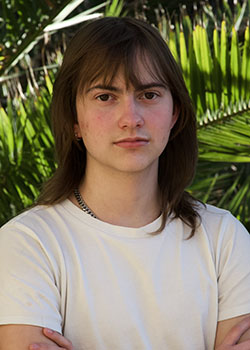
Jay Ward
Hometown: Loveland, CO
Major: MAC minor: religious studies
What was your motivation to major in MAC?
I knew I wanted to study film before I came to Oxy, but the MAC classes I took my first year—along with the experience of competing in and winning the Oxy Film Fest—solidified my decision to major in MAC. It’s still unbelievable that I get to do my favorite thing, watch movies, as homework!
Can you describe your working relationships with MAC professors? Are there any standout classes you’ve taken?
One of my favorite things about attending Oxy is the rapport I am able to establish with my professors, thanks to their efforts to engage with their students and the small class sizes. Through my first-year MAC gateway course with Prof. Fox, I was given the opportunity to present my film studies research at the 2024 National Conference for Undergraduate Research. Prof. Fox supported me through that process, from start to finish. I really enjoyed MAC 240: Intro to Media Practices with Prof. Lin, who is so inspiring and helpful as both a professor and as my academic advisor. My MAC professors have gone out of their way to foster a supportive community within the department and to connect students to career, academic, and artistic opportunities! All my MAC professors build opportunities for outside engagement (like visits to art exhibits and screenings of movies) into their courses.
Whether I choose to go to grad school, into the film industry, or something else, my well-rounded Oxy education has taught me how to think, how to write, and how to tackle any challenges that come my way.
What do you find most compelling about studying MAC?
The way the major constantly motivates me to pursue my creative and academic interests despite any barriers I might face. The MAC department gave me the tools and expertise to develop my artistic vision and begin producing creative work. Even during periods of “writer’s block,” my MAC classes have given me new inspiration, broadening my horizons and deepening my understanding of and love for film and the arts. Sometimes it’s easy to get stuck in your ways artistically, but studying MAC drives me to step out of my comfort zone and explore new areas of study and new modes of creation. For example: I never thought I’d find myself binge-watching documentaries in my free time before I came to Oxy, but thanks to my MAC classes, I’ve found an appreciation for the genre and can say I’ve created documentary work of my own.
What are your ambitions post-Oxy and how has the liberal arts approach helped to put you on this path?
My career aspirations have shifted a lot during my time at Oxy—and I’m still not entirely sure what I want to do after graduation—but the best thing about Oxy is that you don’t have to have your future all figured out because the liberal arts approach prepares you for anything. In addition to my film-focused MAC classes, I have taken classes in history, math, religious studies, and many other subjects. Whether I choose to go to grad school, into the film industry, or something else, my well-rounded education has taught me how to think, how to write, and how to tackle any challenges that come my way.
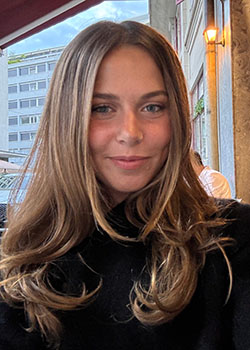
Anna Jenemann
Hometown: Burlington, VT
Major: MAC minor: biology
What was your motivation to major in MAC?
I came to Oxy originally undeclared and took a wide variety of classes. When I eventually took my first MAC course with Prof. Marciniak, Intro to Visual and Critical Studies, I knew that MAC was what I wanted to pursue. The class was a combination of theory, experimentation, critical thinking, and activism. It was the first course I took at Oxy that really embodied the liberal arts experience. I thoroughly enjoyed the material we were learning and looked forward to applying my knowledge to the media that I was constantly consuming.
The faculty works together to ensure their students succeed, and I have really appreciated feeling encouraged and supported by a team.
Can you describe your working relationships with MAC professors? Are there any standout classes you’ve taken?
The MAC professors are incredible. I entered the major late and required a lot of support to complete certain requirements. Prof. Marciniak was unbelievably helpful and advocated on my behalf in order to get me to where I needed to be. The faculty works together to ensure their students succeed, and I have really appreciated feeling encouraged and supported by a team. In addition to feeling supported, MAC professors have urged me to push my limits and challenge myself. One of the standout classes I took was Media Activism Through Participatory Video with Prof. Lin, where I was introduced to a community partner and worked alongside them to motivate social change, an experience that has shaped my educational and personal life.
Have you taken part in any student research opportunities through Oxy? Can you describe your senior comps project?
As I mentioned, I was connected with a community partner in my Media Activism Through Participatory Video Class. This organization works with femme-identifying individuals living in Skid Row. Through this partnership, I had the opportunity to participate in arts engagement and local community building. I have continued this work and research through Oxy’s Center for Community-Based Learning and am currently working on my senior comps, which is inspired by this field experience.
To see more Meet Our Majors profiles, visit the main page.

